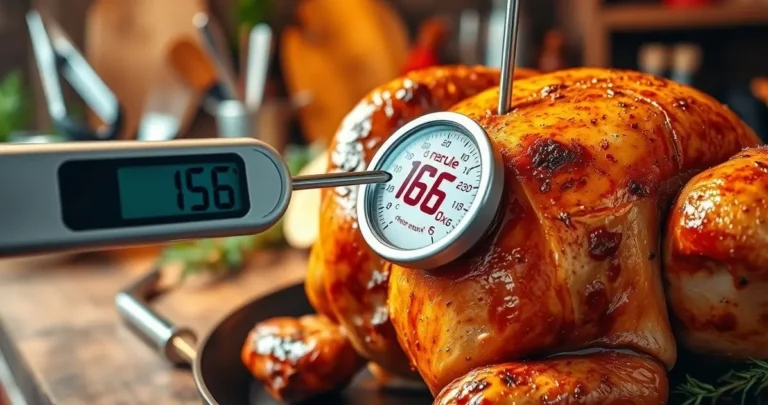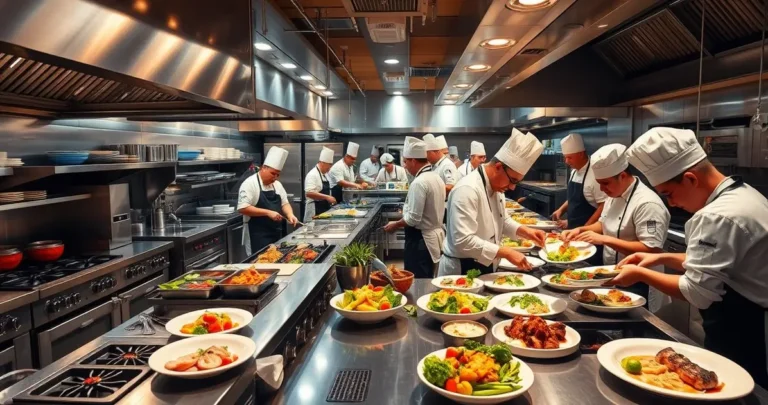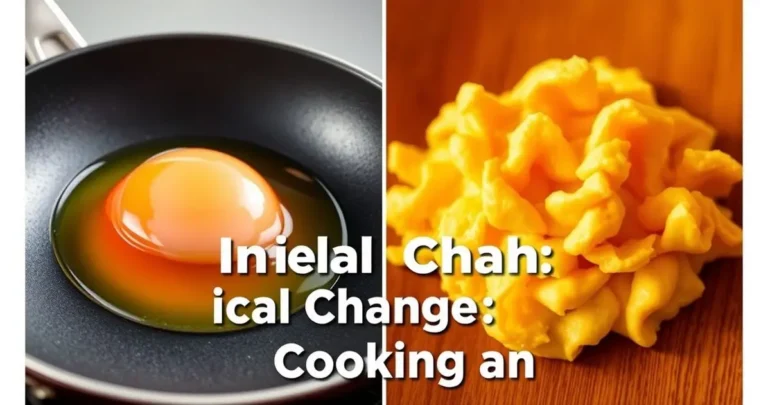Cooking utensils are often crafted from metals due to their durability, heat conductivity, and non-reactive properties. Metal utensils are essential for achieving optimal cooking results and enhancing the culinary experience.
Why cooking utensils are made of metals
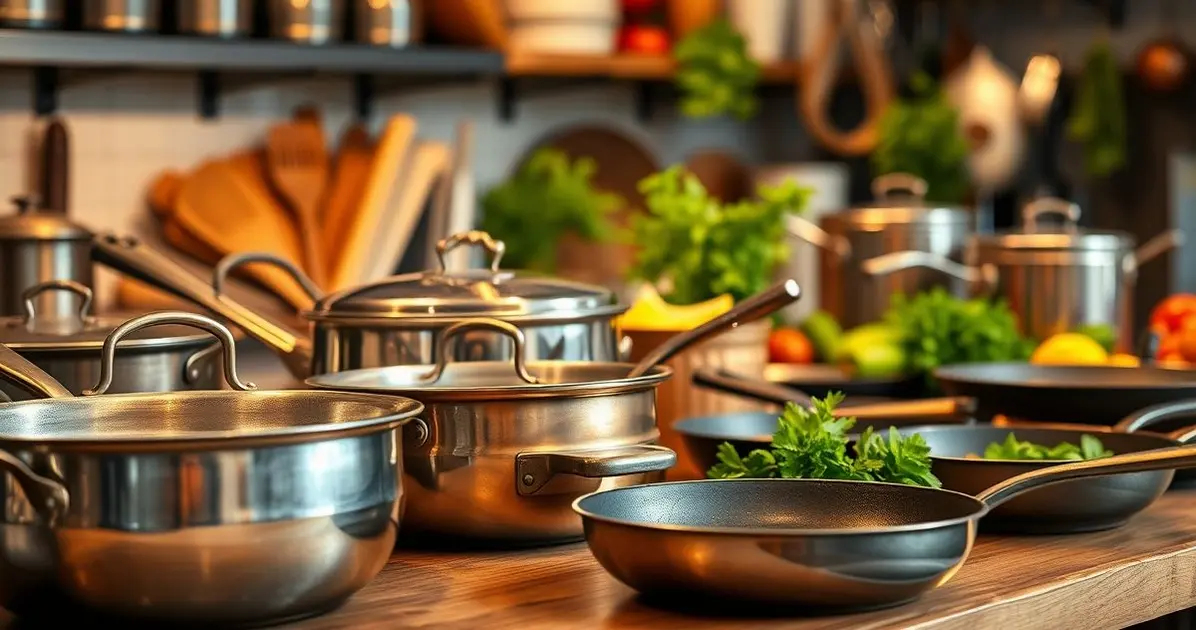
Metal utensils are favored in cooking for their robustness and ability to withstand high temperatures. Metals like stainless steel, copper, and cast iron provide excellent heat distribution, prolonging the life of the utensil while making cooking efficient and enjoyable.
Benefits of Metal Cooking Utensils
Metal cooking utensils are a popular choice in kitchens around the world due to their numerous advantages. These utensils, made from materials such as stainless steel, aluminum, and copper, offer a variety of benefits that enhance cooking experiences. Here’s a closer look at the key benefits of using metal cooking utensils:
1. Durability: Metal utensils are known for their strength and longevity:
- Resistance to Wear and Tear: Unlike plastic or wooden utensils, metal utensils are resistant to warping, scratching, and chipping, making them ideal for everyday use.
- Long-Lasting Investment: With proper care, metal utensils can last for many years, providing excellent value for your kitchen.
2. Excellent Heat Conductivity: Metal utensils are great conductors of heat, which is essential for effective cooking:
- Even Cooking: Metals allow for even heat distribution, ensuring that food cooks uniformly and preventing hot spots that can lead to uneven cooking.
- Quick Heating: Metal utensils heat up quickly, allowing for faster cooking times and better control over the cooking process.
3. Non-Reactive Properties: Many metals, especially stainless steel, are non-reactive:
- Safe for All Foods: Non-reactive metals do not interact with acidic or alkaline foods, ensuring that the flavors of your dishes remain pure and unaffected.
4. Versatility: Metal cooking utensils are versatile and can be used for a wide range of cooking methods:
- Multiple Cooking Techniques: Whether frying, boiling, baking, or sautéing, metal utensils can handle various tasks, making them essential tools in the kitchen.
- Compatibility with Cookware: Metal utensils can be safely used with different types of cookware, including non-stick, ceramic, and cast iron, without causing damage.
5. Easy to Clean: Metal utensils are generally easy to maintain:
- Hygienic Surface: Metals do not harbor bacteria or odors, making them a safe option for food preparation.
- Dishwasher Safe: Many metal utensils are dishwasher safe, simplifying the cleaning process.
6. Aesthetic Appeal: Metal utensils often have a sleek and modern design:
- Timeless Look: Stainless steel and polished metals add a touch of elegance to your kitchen, complementing various decor styles.
In summary, the benefits of metal cooking utensils—including durability, excellent heat conductivity, non-reactive properties, versatility, ease of cleaning, and aesthetic appeal—make them a top choice for home cooks and professional chefs alike. By incorporating metal utensils into your kitchen, you can enhance your cooking experience and create delicious meals with confidence.
Types of Metals Used in Cookware
When it comes to cookware, the type of metal used can significantly impact cooking performance, durability, and safety. Here’s a look at the various types of metals commonly used in cookware and their unique properties:
1. Stainless Steel: Stainless steel is one of the most popular materials for cookware due to its durability and resistance to rust and corrosion. Key features include:
- Non-Reactive: Stainless steel does not react with acidic or alkaline foods, making it safe for all types of cooking.
- Durability: It is highly resistant to scratches and dents, ensuring long-lasting use in the kitchen.
- Heat Distribution: High-quality stainless steel cookware often has a core of aluminum or copper to improve heat conduction and distribution.
2. Cast Iron: Cast iron cookware is known for its exceptional heat retention and even cooking. Its benefits include:
- Natural Non-Stick Surface: When properly seasoned, cast iron develops a natural non-stick surface that enhances flavor.
- Versatility: Cast iron can be used on the stovetop, in the oven, or even over an open flame, making it suitable for various cooking methods.
- Iron Fortification: Cooking with cast iron can add trace amounts of iron to your food, which can be beneficial for those with iron deficiencies.
3. Aluminum: Aluminum cookware is lightweight and conducts heat well, making it a popular choice for many home cooks. Key points include:
- Heat Conductivity: Aluminum heats up quickly and evenly, providing excellent cooking performance.
- Reactivity: Uncoated aluminum can react with acidic foods, which may affect flavor. Anodized aluminum is a safer option, as it is treated to prevent reactivity.
4. Copper: Copper cookware is prized for its superior heat conductivity and precise temperature control. Benefits include:
- Responsive Cooking: Copper pans heat up and cool down quickly, allowing for precise temperature adjustments.
- Aesthetic Appeal: Copper cookware has a beautiful, classic appearance that can enhance kitchen decor.
5. Non-Stick Coated Metals: Many cookware pieces feature non-stick coatings, such as Teflon or ceramic, applied to aluminum or stainless steel:
- Convenience: Non-stick coatings make cooking and cleaning easier by preventing food from sticking to the surface.
- Health Considerations: It’s important to choose high-quality non-stick cookware that is free from harmful chemicals like PFOA.
In summary, the types of metals used in cookware—stainless steel, cast iron, aluminum, copper, and non-stick coated metals—each offer unique benefits and characteristics. Understanding these differences can help you choose the right cookware for your cooking style and preferences, ensuring a safe and enjoyable culinary experience.
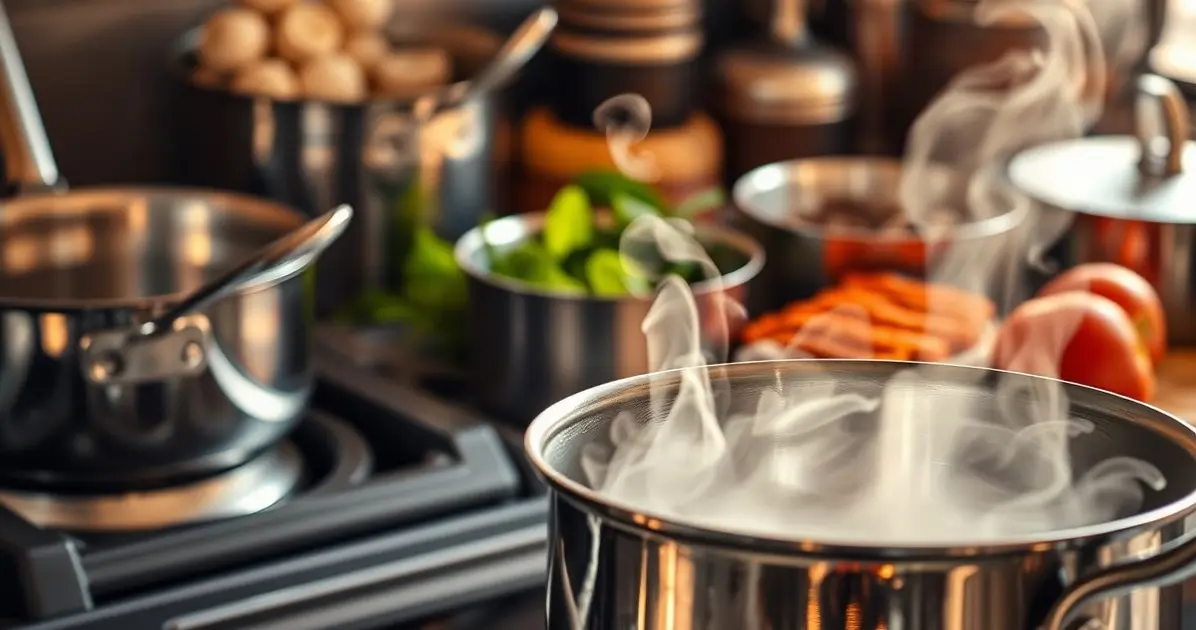
Applications of Metal Utensils in Cooking
Metal utensils are a staple in kitchens around the world due to their durability, heat resistance, and versatility. Here’s a detailed look at the various applications of metal utensils in cooking:
1. Cooking and Sautéing: Metal utensils are ideal for cooking and sautéing due to their ability to withstand high temperatures:
- Stirring and Mixing: Metal spoons and spatulas are perfect for stirring and mixing ingredients in hot pans, as they can handle the heat without melting or warping.
- High-Temperature Cooking: Metal utensils are suitable for high-heat cooking methods, such as frying and searing, where durability and heat resistance are essential.
2. Baking: Metal utensils play a crucial role in baking, from mixing dough to shaping pastries:
- Whisks: Metal whisks are effective for beating eggs, mixing batters, and incorporating air into mixtures, leading to light and fluffy baked goods.
- Cookie Cutters: Metal cookie cutters are durable and can easily cut through dough, ensuring clean shapes for cookies and pastries.
3. Serving: Metal utensils are often used for serving food due to their strength and aesthetic appeal:
- Serving Spoons: Metal serving spoons are ideal for dishing out portions of food from serving dishes, providing a sturdy and elegant option for any meal.
- Salad Tongs: Metal tongs are perfect for serving salads and other dishes, allowing for easy handling and portion control.
4. Grilling: Metal utensils are essential for grilling, where heat and durability are critical:
- Grill Spatulas: Metal spatulas designed for grilling allow you to flip burgers and other foods easily without breaking them apart.
- Skewers: Metal skewers are reusable and can withstand high temperatures, making them ideal for kebabs and grilled vegetables.
5. Food Preparation: Metal utensils are also widely used in food preparation tasks:
- Knives: Metal knives are essential tools for chopping, slicing, and dicing ingredients, providing precision and control.
- Graters and Zesters: Metal graters and zesters are effective for adding texture and flavor to dishes, making them valuable tools in food preparation.
In summary, metal utensils serve a wide range of applications in cooking, from cooking and sautéing to baking, serving, grilling, and food preparation. Their durability, heat resistance, and versatility make them indispensable tools in any kitchen, allowing cooks to create delicious meals with confidence.
Tips for Choosing the Right Metal Utensils
Choosing the right metal utensils for your kitchen is essential for enhancing your cooking experience and ensuring safety. Here are some practical tips to help you select the best metal utensils:
1. Consider the Material: Different metals have unique properties that can affect their performance:
- Stainless Steel: Look for high-quality stainless steel utensils that are durable, non-reactive, and resistant to rust and corrosion.
- Cast Iron: For cookware, consider cast iron for its excellent heat retention and natural non-stick properties when seasoned properly.
- Aluminum: If you opt for aluminum utensils, choose anodized aluminum, which is more durable and less reactive with acidic foods.
2. Evaluate Durability: Durability is a key factor when selecting metal utensils:
- Heavy-Duty Construction: Choose utensils that are well-constructed and sturdy, as they will withstand regular use and last longer.
- Resistance to Warping: Ensure that the utensils can withstand high temperatures without warping or losing their shape, particularly for cooking tools.
3. Check for Safety Features: Look for metal utensils that have safety features to enhance usability:
- Heat-Resistant Handles: Consider utensils with heat-resistant handles to prevent burns while cooking.
- Non-Slip Grips: Non-slip grips can enhance control and safety when handling utensils, especially when working with hot foods.
4. Choose Appropriate Sizes: Select utensils that are appropriately sized for your cooking tasks:
- Variety of Sizes: Having a range of sizes, from small spoons for stirring to large spatulas for flipping, can make cooking more efficient.
- Comfortable Grip: Ensure that the handles of the utensils are comfortable to hold, as this can make a significant difference during extended cooking sessions.
5. Look for Easy Maintenance: Consider how easy it is to clean and maintain the utensils:
- Dishwasher Safe: Many stainless steel and silicone utensils are dishwasher safe, making cleanup quick and convenient.
- Simple Care Instructions: Choose utensils that do not require complicated care routines, allowing for hassle-free use.
6. Research Brand Reputation: When selecting metal utensils, choose reputable brands known for their quality and safety standards:
- Customer Reviews: Reading customer reviews can provide insights into the durability and performance of the utensils you are considering.
- Certifications: Look for brands that offer certifications indicating their products are made from safe, food-grade materials.
In summary, choosing the right metal utensils involves considering the material, durability, safety features, appropriate sizes, ease of maintenance, and brand reputation. By following these tips, you can select high-quality utensils that enhance your cooking experience and contribute to a safe and efficient kitchen environment.
Conclusion
In conclusion, selecting the right metal utensils is essential for optimizing your cooking experience and ensuring safety in the kitchen. By considering factors such as material, durability, safety features, and ease of maintenance, you can make informed choices that enhance both the quality of your cooking and the longevity of your utensils.
Stainless steel, cast iron, and anodized aluminum each offer unique advantages that cater to different cooking needs. Additionally, paying attention to brand reputation and customer reviews can help you find high-quality products that align with your culinary practices.
Ultimately, investing in the right metal utensils not only improves your cooking efficiency but also promotes a healthier cooking environment. By following the tips outlined in this guide, you can equip your kitchen with the best tools, allowing you to create delicious meals with confidence and ease.
FAQ – Frequently Asked Questions about Metal Cooking Utensils
What materials are considered safe for cooking utensils?
Safe materials for cooking utensils include stainless steel, cast iron, ceramic, glass, and food-grade silicone.
What are the benefits of using stainless steel utensils?
Stainless steel utensils are durable, non-reactive, easy to clean, and resistant to rust and corrosion.
Why is cast iron cookware popular?
Cast iron cookware is known for excellent heat retention, natural non-stick properties when seasoned, and the ability to add trace amounts of iron to food.
How do I choose the right metal utensils for my kitchen?
Consider the material, durability, safety features, and ease of maintenance when selecting metal utensils for your kitchen.
Are non-stick metal utensils safe to use?
Yes, but ensure they are free from harmful chemicals like PFOA and that you use them according to the manufacturer’s instructions to avoid damaging the coating.
How should I maintain my metal cooking utensils?
Regularly clean them with mild soap and water, avoid abrasive cleaners, and inspect for wear and tear to ensure they remain safe and effective.
See more
Discover plenty of easy and delicious recipes you can make at home, from hearty dinners to indulgent desserts and wholesome breakfasts.


